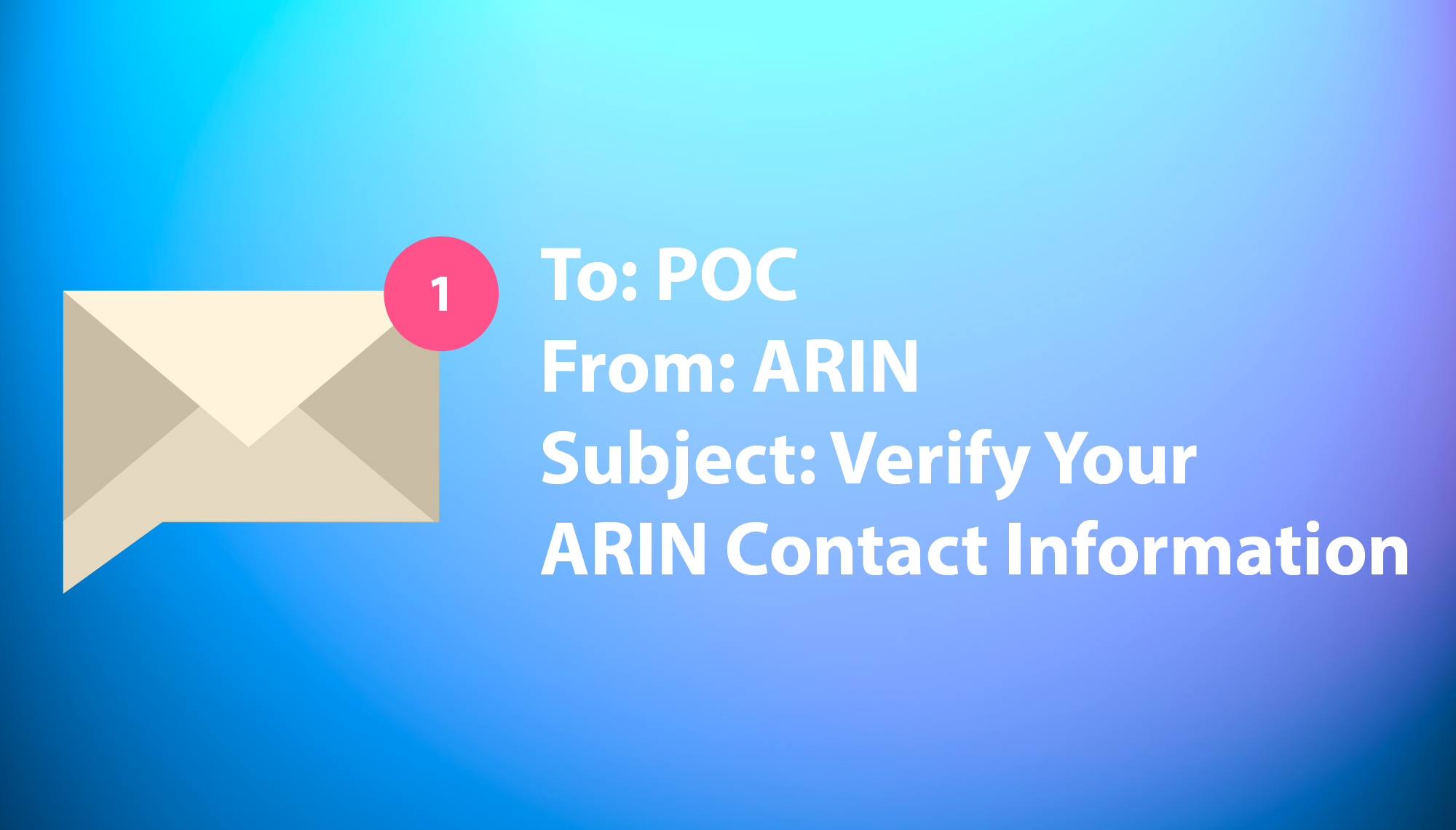
Why is ARIN Contacting Me about My Info in Whois?
Have you recently received an email request from ARIN (The American Registry for Internet Numbers) to verify your ARIN contact information in Whois? Are you curious why you received the message? Do you want to know what you are required to do if you receive such a message from us? Are you unsure how your contact information was inserted into ARIN’s Whois? I hope to answer all your questions on the topic of our annual Whois point of contact (POC) validation, so keep reading.
Let’s start with; who is ARIN?
ARIN is a nonprofit, member-based organization that supports the operation and growth of the Internet. ARIN accomplishes this by carrying out its core service, which is the management and distribution of Internet number resources such as Internet Protocol (IP) addresses and Autonomous System Numbers (ASNs) within its service region, which is comprised of Canada, the United States, and many Caribbean and North Atlantic islands.
ARIN is one of five Regional Internet Registries (RIRs) throughout the world which are tasked with providing Internet number registry services for their respective regions in accordance with their community developed and adopted policies.
One of ARIN’s community developed and adopted policies is the Annual Whois Point of Contact (POC) Validation policy, which requires us to ask people who hold records in the ARIN Whois each year to keep them up to date.
Why did I receive a message from ARIN to verify my contact information?
Under the Annual Whois POC Validation policy, which is outlined in section 3.6 of the Number Resources Policy Manual, ARIN is required contact each, Admin, Tech, NOC, and Abuse POC annually for verification.
POC Validation messages are distributed to each POC in ARIN’s Whois on an annual basis. The POC is notified via three methods;
- an email to the POC’s email address,
- message in the ARIN Online Message Center for accounts linked to the POC, and
- an email to all ARIN Online accounts linked to the POC.
The Annual POC Validation emails and message center notifications are sent on the “anniversary” of the last modification date for the POC and again 30-days later. If after 60-days the POC still hasn’t been validated, a message is added to the POC which will be visible in ARIN’s Whois. The message indicates that ARIN has attempted to validate the data for this POC, but has received no response from the POC.
What do I need to do about the request from ARIN to verify my contact information?
You can validate your POC by either:
- selecting the URL located in the Annual POC Validation email,
- replying to the POC Validation email with CORRECT in the subject line,
- logging into your ARIN Online account and selecting the “Validate” button located within the Point of Contacts Records page, or
- making and saving modifications to the POC.
Please keep in mind, you don’t need to wait until you receive an Annual POC Validation email to make modifications to your POC. Any time you make and save modifications, your POC will automatically be validated.
If you do nothing to verify your information, your publicly-available entry in Whois will note that that your contact is unvalidated since the date of creation, modification, or last verification.

But wait, how did my contact information get into ARIN’s Whois?
There are a couple ways your contact information could have been inserted into ARIN’s Whois.
- Your organization could have received IP addresses from your Internet Service Provider (ISP). As a matter of two other ARIN policy requirements, if an ISP reassigns IPv4 addresses or IPv6 addresses to their downstream customer, those reassignments need to be registered in ARIN’s Whois, or other distributed information service. When registered in ARIN’s Whois, ISPs were previously able to create POCs for their downstream customers and could have create a POC for you as the contact for your organization.
- Another individual from your organization could have created a POC for you as well. We’ve seen where someone is retiring and they create a POC and set that person up on the Whois records to ensure there is someone that will be able maintain the Whois records and ensure there is not unexpected loss of registration services.
So, why would I want to verify my contact information?
Your POC is part of ARIN’s Whois, and the main purpose of ARIN’s Whois is to maintain and display accurate registration records of who has the rights of use to a particular Internet number resource.
It is very important to have up-to-date contact information in ARIN’s Whois to ensure you maintain access to your Internet number resources. Having out-of-date contact information can lead to unwelcomed or unexpected loss of registration services.
In addition, many network operators use ARIN’s Whois and depend on the accuracy of contact information so they can contact organizations for a variety of Internet-related issues such as routing, abuse, and many other reasons.
Finally, many other organizations use ARIN’s Whois as well, including law enforcement agencies. Leslie Nobile, Senior Director, Trust and Public Policy wrote a blog about How Whois Accuracy Impacts Public Safety
We have tried to make keeping your information in Whois as easy as possible, so next time you get a message from us asking you to verify your contact information you’ll know why and how to do it in one easy step, all the while making sure you maintain access to your IPs and/or ASNs.
If you have any questions about your POC or the Annual Whois POC Validation process, please submit an Ask ARIN ticket through your ARIN Online account, or give our Registration Services Team a call at 703.227.0660.
Recent blogs categorized under: Data Accuracy
GET THE LATEST!
Sign up to receive the latest news about ARIN and the most pressing issues facing the Internet community.
SIGN ME UP →Blog Categories
Updates • Public Policy • RPKI • ARIN Bits • Fellowship Program • Data Accuracy • Security • Tips • Caribbean • Grant Program • IPv6 • Business Case for IPv6 • Internet Governance • Elections • Outreach • Training • IPv4 • Customer Feedback • IRR



